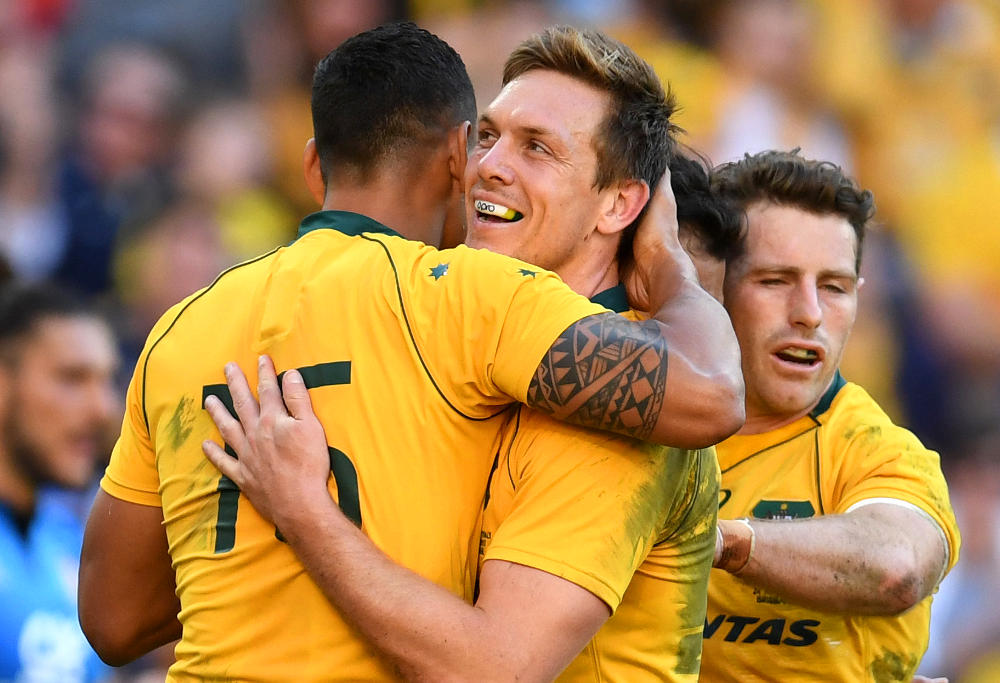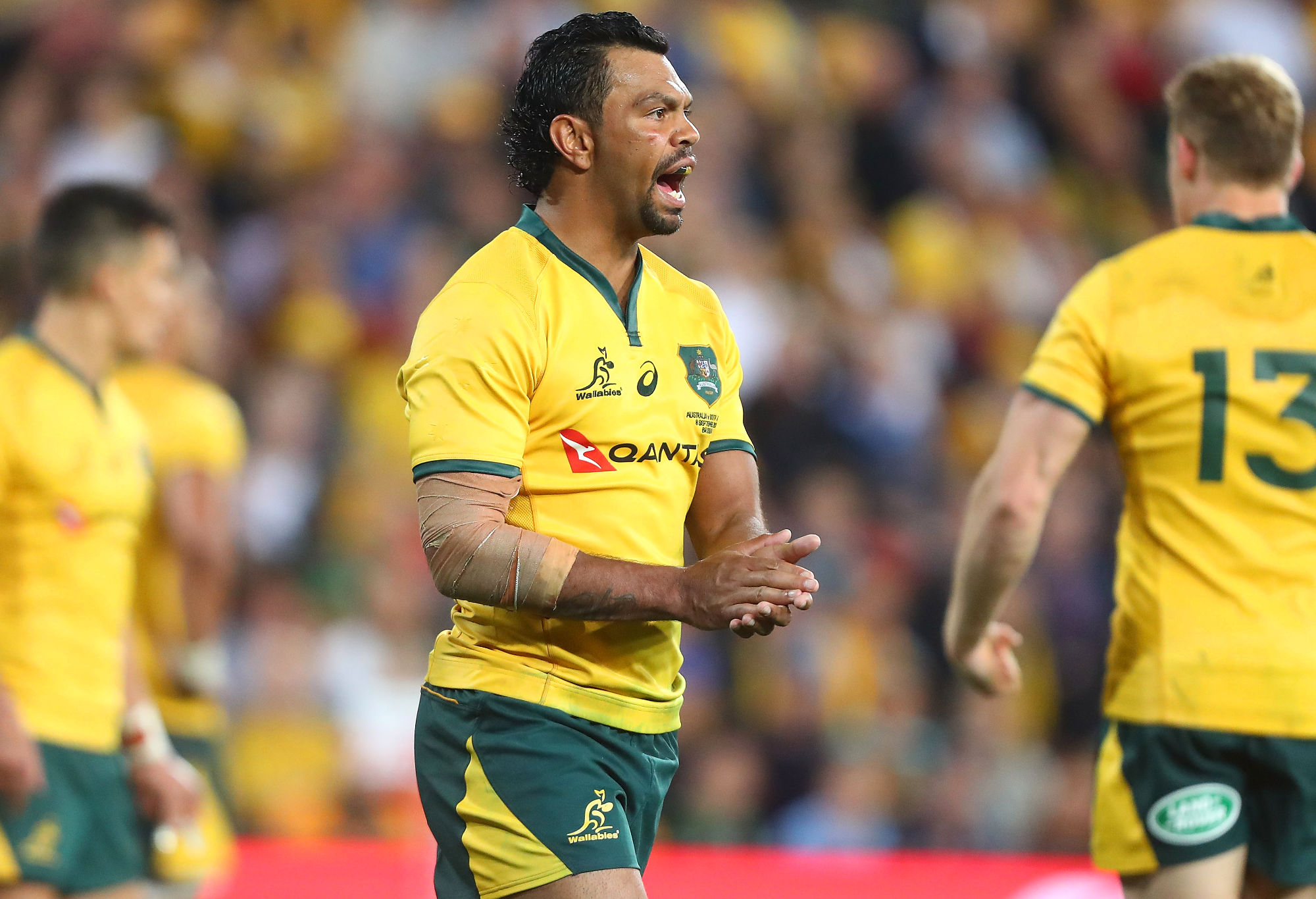As the Wallabies prepare for the Test match with Wales this weekend at Cardiff’s Millennium Stadium, coach Michael Cheika should reflect upon the wisdom of Winston Churchill when selecting his team and game plan to defeat Warren Gatland’s Wales.
Churchill is famously quoted on strategy saying, “However beautiful the strategy, you should occasionally look at the results.”
The results for the Wallabies in 2018 are, at best, politely encouraging.
The strategy of constantly playing for width has proven costly for them, with the team ‘achieving’ a last-minute series loss to Ireland and an often-embarrassing Rugby Championship that brought Cheika’s own future with Rugby Australia into question.
The signs since the second half at Salta have been encouraging, with the Wallabies looking to work through the phases with more patience, being less dogmatic about how they play the game and taking points on offer.
I suggest any deviation from this path will cost them dearly against Wales this weekend.
In a 21-10 victory over a mediocre Scottish side last weekend, Wales exhibited the threat they will be to Australia this weekend and later in the Rugby World Cup, where both sides are pitted against each other in the pool stages.
Wales give the opposition very little, pressuring their opponents to play rugby on the back foot by the use of box kicking and tactical field kicking coupled with a suffocating chase aimed to force pressure and errors, to which they are often successful.
On attack, Wales have a very solid set-piece they can score from, as evidenced by the brilliant try from outside centre Jonathan Davies last weekend.
From an attacking lineout, the uncompromising no. 8 Ross Moriarty ran an attacking inside line between his centres Hadleigh Parkes and Davies, with Parkes off-loading to a looping Gareth Anscombe who then found Davies with a short pass.
The rest was history, as they say. A beautifully constructed and executed try for the ages.
Despite these strengths, the Welsh do have their weaknesses. In about the eighth minute of the recent Scottish fixture, they found themselves in a precarious position with Scotland on the attack down the left short-side with a four on three situation.
The inexperienced Scottish fly-half Adam Hastings chose to kick ahead instead of putting the ball through the hands that would have likely culminated in an early try.
In Yokohama against the All Blacks, the Wallabies illustrated that, when maintaining possession and stretching the opposition patiently, opportunities present.

That was evidenced by the near Dane Haylett-Petty try and the actual try by Sefa Naivalu.
Both opportunities were down the left flank, the same flank Scotland exposed against Wales but failed to capitalise on.
The lineout has faulted for the Wallabies in 2018, however, it could be an opportunity to launch their attack from as Wales looked brittle at times in their own line-out defence.
In fact, Scotland’s only try came from an attacking lineout and with a relatively textbook drive shattering the Welsh as Stuart McInally crossed the line.
Another chink in the Welsh armour is the defence of their inside centre Hadleigh Parkes.
Parkes is a Kiwi journeyman who qualified for the Principality through residence. An honest toiler is Parkes, yet there are reasons why he never really threatened All Black selection and I suggest his defence is one of them.
He missed four tackles against Scotland, who were fairly lateral and impotent in attack.
If selected, Parkes should be targeted, in particular, the outside shoulder.
One of my favourite movies is Patton, which is about the great American general who defeated the brilliant German field marshal Erwin Rommel in North Africa in 1942.
I’m not sure of the accuracy of the quote but one of Patton’s aides says, effectively, ‘But General, if you have defeated Rommel’s plans surely you have defeated Rommel.’
I suggest this is the mindset Michael Cheika should employ to defeat Warren Gatland this weekend.
If Wales are to box kick and tactically kick their way into the Australian half this weekend, the Wallabies should employ a back three that are not only strong under the high ball, but also damaging in their ability to return the ball and counter attack.
Clearly, Israel Folau will be selected on one wing as his credentials under the high ball and in attack are not in question – with the same applying to Dane-Haylett-Petty.
Yet, are Marika Korabiete or Sefa Naivalu both solid under the high ball with the ability to counter-attack?

Both are exceptionally quick and know how to finish, but I suggest Cheika should set a trap for Gatland and actually play Kurtley Beale at fullback, who is safe under the high ball but deadly on the counter-attack, a facet of play somewhat missing from the Wallabies’ game recently.
This selection would pave the way for Samu Kerevi to play at inside-centre, his best position.
He would be a handful for Parkes, but would also facilitate a simpler Wallabies defensive structure, where he’d defend in the 12 channel, where his own defensive frailties are less likely to be exposed.
He simply is not quick enough to mark up on Davies. Such a selection would also allow for the highly rated Jordan Petaia to make his test debut in the 13 jumper which appears to be his natural position.
With the notion of an independent Wallabies selector being appointed, Cheika should illustrate to his team, critics and opposition that he is willing to identify a strategy and select a team to defeat each individual side as they come.
A one-size-fits-all strategy might look good, but it clearly has not got the results desired.
My match day 23
Scott Sio
Folau Fainga’a
Alaan Alaalatoa
Isaac Rodda
Adam Coleman
Ned Hanigan
Michael Hooper
David Pocock
Will Genia
Bernard Foley
Dane Haylett-Petty
Samu Kerevi
Jordan Petaia
Israel Folau
Kurtley Beale
Reserves
Totafu Polota-Nau
Sekope Kepu
Taniela Tupou
Rob Simmons
Jack Dempsey
Nick Phipps
Matt Toomua
Adam Ashley-Cooper






























































































